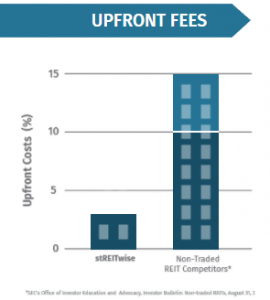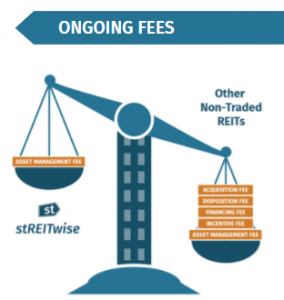stREITwise is a REIT (Real estate investment trust). REITs invest in property, they offer the benefits of being a landlord without the associated hassle. There are different flavours of REIT each with different costs and benefits. REITs are not taxed at the corporate level because by law they need to redistribute the profits to the investors.
In this interview, Jeffery Krash, CEO of stREITwise explains what are investors should be aware of when investing in REITs.
In a nutshell, why is stREITwise interesting to investors?
stREITwise is a REIT offering the same exposure to institutional-quality real estate as the other guys… only cheaper. Cheaper because we’re offering shares direct to investors online – not through broker/dealers (ie financial advisors) who charge high commissions. So we pass that savings on to investors. And lower fees translate to greater return prospects.
Can you describe stREITwise in numbers?
stREITwise is sponsored by Tryperion Partners – a real estate private equity firm targeting value-add transactions with >$100 million under management in two separate closed-end funds from mostly HNW and foundation clients. We will continue with the Tryperion funds, but we created stREITwise to give the crowd an opportunity to invest alongside professional real estate investors. As of 1Q17, Tryperion’s first two funds have generated a 16.9% IRR, net of fees, based on a combination of a few full realizations and a hypothetical liquidation of the remaining unrealized portfolio at fair market value.
stREITwise, is not listed on the stock exchange, what are its reporting obligations?
stREITwise is a Regulation A+ offering. That means, among other things, that we will file audited annual financials, semi-annual reports, and major updates with the SEC. In addition, we intend to differentiate ourselves by providing acquisition analysis as well. We’re in the business of building trust – the crowd should know how we think about deals.
Do the shareholders of stREITwise own the stock of stREITwise or do they own directly the properties that stREITwise purchases?
stREITwise is a series of non-traded REITs with each REIT focused on one specific property type. Our first offering will be “1st stREIT Office” – a $50 million office REIT which will include Panera Bread’s HQ building in St. Louis, MO. Investors in “1st stREIT Office” will own shares of “1st stREIT Office,” which in turn owns the properties directly. We will roll out other property-type specific REITs soon. For example, we will have a “1st stREIT Retail” offering, a “1st stREIT Apartment” offering, and so on until we cover all the major property types.
type. Our first offering will be “1st stREIT Office” – a $50 million office REIT which will include Panera Bread’s HQ building in St. Louis, MO. Investors in “1st stREIT Office” will own shares of “1st stREIT Office,” which in turn owns the properties directly. We will roll out other property-type specific REITs soon. For example, we will have a “1st stREIT Retail” offering, a “1st stREIT Apartment” offering, and so on until we cover all the major property types.
Can the properties bought by stREITwise be mortgaged?
We will apply conservative leverage to our portfolio (~50% of value). The deals we’re targeting are not far out on the risk spectrum, so we do not anticipate facing negative returns. But to the extent that occurs, we are equipped with a line of credit to get us through a jam.
Who are the auditors of stREITwise?
RSM – the 5th largest auditor in the US.
Does stREITwise focus on any geographical areas or property types in particular?
Although Tryperion Partners, through its fund vehicles, has invested in and has an expertise in all the major property types (office, multifamily, retail, industrial, hotel), our first investment opportunity, “1st stREIT Office,” will focus on office properties. We will focus on all US markets, with a particular focus on markets with mispriced risk.
in all the major property types (office, multifamily, retail, industrial, hotel), our first investment opportunity, “1st stREIT Office,” will focus on office properties. We will focus on all US markets, with a particular focus on markets with mispriced risk.
The property market passed through a turbulent time 9 years ago, what are the stREITwise strategies to mitigate such risks in the future?
Generally speaking, there are really only a couple ways you can lose in real estate: taking on too much debt and taking on too much risk. We’re managing both risks by limiting our portfolio leverage to ~50% of value and by focusing on stabilised properties instead of shooting for the moon on development plays and other risky repositionings.
Why is the stREITwise fee model the best selling point of this REIT when compared to similar products?
Here are our fees: 3% upfront fee and 2% asset management fee. That’s it. No hidden fees

buried in our offering circular. Compare that to our competitors who charge 10-15% upfront fees and a litany of ongoing fees such as asset management fees, acquisition fees, disposition fees, financing fees and incentive fees. Don’t take my word for it – see what the SEC wrote on the subject here
What are the pros and cons between listed and unlisted REITs?
Certainly, the biggest advantage Non-Traded REITs have over Traded REITs is that Non-Traded REITs generally offer a higher dividend. The tradeoff is more limited liquidity. Non-Traded REITs generally offer liquidity through a quarterly share repurchase program, but these programs do not guarantee liquidity. Non-Traded REITs are for people who are investing their savings – not their next rent check.
Is stREITwise open to international investors?
Anybody with a US bank account may invest with stREITwise.
When and How can investors sell their shares in the REIT?
We offer a quarterly share repurchase program, with certain limitations that are further discussed in our offering circular.
Can the dividends earned be automatically reinvested in stREITwise?
We don’t currently offer a dividend reinvestment program. However, we have been asked this question so much that we are beginning to look into it.
Where do you see stREITwise in the next 3 years?
Because of our revolutionary fee structure, unprecedented transparency, and solid investment track record, stREITwise will have secured the crowd’s trust. We will have a few hundred million in total AUM in five different REITs, one for each of the following property types: office, retail, multifamily, industrial, hotel.
For more information please visit: https://streitwise.com/











